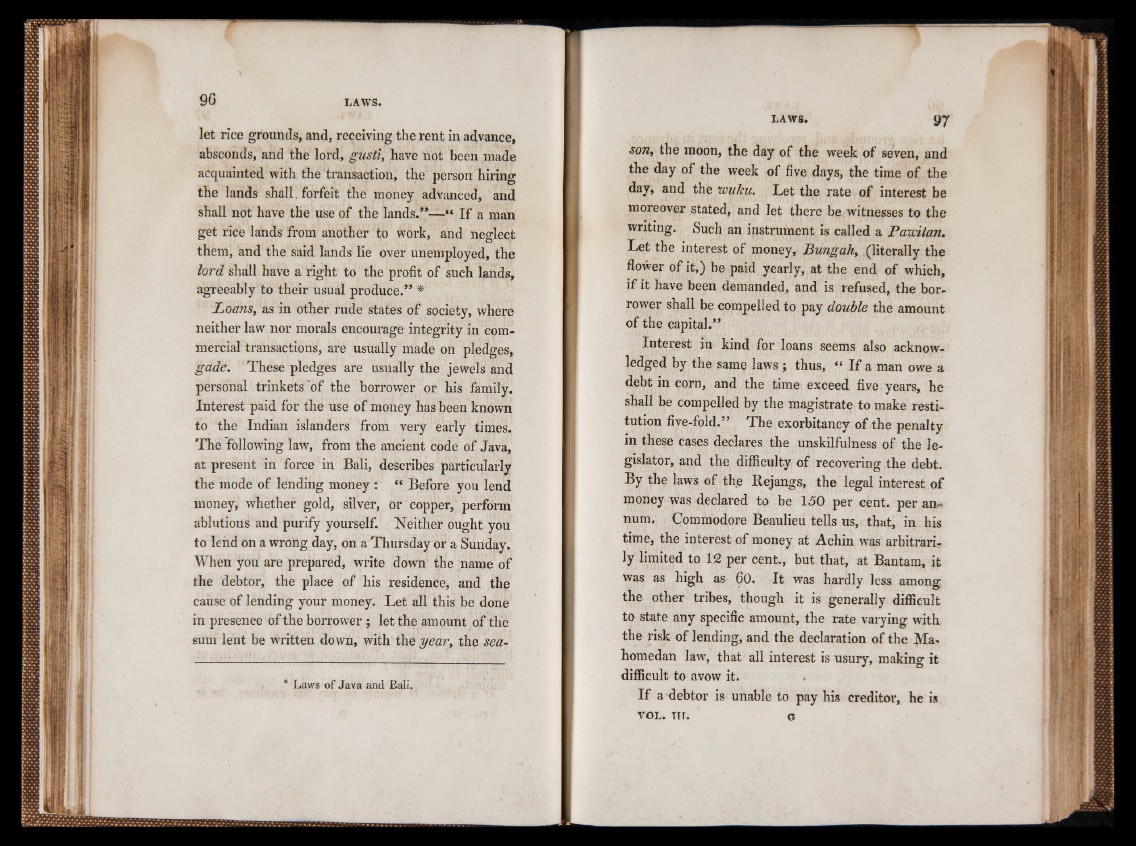
let rice grounds, and, receiving the rent in advance,
absconds, and the lord, gusti, have not been made
acquainted with the transaction, the person hiring
the lands shall. forfeit the money advanced, and
shall not have the use of the lands.”—-“ If a man
get rice lands from another to work, and neglect
them, and the said lands lie over unemployed, the
lord shall have a right to the profit of such lands,
agreeably to their usual produce.” *
Loans, as in other rude states of society, where
neither law nor morals encourage integrity in commercial
transactions, are usually made on pledges,
gade. These pledges are usually the jewels and
personal trinkets of the borrower or his family.
Interest paid for the use of money has been known
to the Indian islanders from very early times.
The following law, from the ancient code of Java,
at present in force in Bali, describes particularly
the mode of lending money : “ Before you lend
money, whether gold, silver, or copper, perform
ablutions and purify yourself. Neither ought you
to lend on a wrong day, on a Thursday or a Sunday.
When you are prepared, write down the name of
the debtor, the place of his residence, and the
cause of lending your money. Let all this be done
in presence of the borrower ; let the amount of the
sum lent be written down, with the year, the sea-
* Laws of Java and Bali.
LAWS. 97
son, the moon, the day of the week of seven, and
the day of the week of five days, the time of the
day, and the 'wulcu. Let the rate of interest be
moreover stated, and let there be witnesses to the
writing. Such an instrument is called a Pawitan.
Let the interest of money, Bungah, (literally the
flower of it,) be paid yearly, at the end of which,
if it have been demanded, and is refused, the borrower
shall be compelled to pay double the amount
of the capital.”
Interest in kind for loans seems also acknowledged
by the same laws j thus, “ If a man owe a
debt in corn, and the time exceed fiye years, he
shall be compelled by the magistrate to make restitution
five-fold.” The exorbitancy of the penalty
in these cases declares the unskilfulness of the legislator,
and the difficulty of recovering the debt.
By the laws of the Rejangs, the legal interest of
money was declared to be 150 per cent, per an*
num. Commodore Beaulieu tells us, that, in his
time, the interest of money at Achin was arbitrarily
limited to 12 per cent., but that, at Bantam, it
was as high as 60. It was hardly less among
the other tribes, though it is generally difficult
to state any specific amount, the rate varying with
the risk of lending, and the declaration of the Ma-
homedan law, that all interest is usury, making it
difficult to avow it.
If a-debtor is unable to pay his creditor, he is
v o l. n r. o